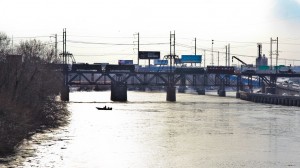Feds issue emergency order to crude oil shippers

Kimberly Paynter/WHYY
In January, seven cars of a 101-car train traveling from Chicago to a refinery in South Philadelphia slid off the tracks on the Schuylkill Arsenal Bridge.
This post was updated on 2/26/14 at 11 a.m.
Four days after American railroads agreed to voluntary changes to make shipping crude oil by rail safer, the federal government has taken the effort a step further. The Department of Transportation issued an emergency order Tuesday requiring shippers to test each load of crude oil before transporting it and to classify the shipments as higher risk.
“From emergency orders to voluntary agreements, we are using every tool at our disposal to ensure the safe transportation of crude,” Transportation Secretary Anthony Foxx said in a statement.
It is the department’s fourth emergency order in less than a year, following a string of derailments involving oil trains, including two recent incidents in Pennsylvania. Earlier this month, an oil train derailed in the town of Vandergrift, about 40 miles northeast of Pittsburgh, spilling thousands of gallons of heavy Canadian crude. In January, tanker cars carrying light crude from North Dakota’s Bakken Shale slid off the tracks of a rail bridge in Philadelphia.
The emergency order applies to all shipments of crude oil, according to a DOT spokesman. However, the federal government is targeting shipments coming from the Bakken.
Rail shipments have increased dramatically as production in North Dakota continues to yield a glut of light, sweet crude. The Wall Street Journal has reported that Bakken oil contains higher levels of combustible gases than is found in other crudes, which may be the reason that some of the recent derailments have resulted in explosions.
The DOT is concerned that shippers may not be properly classifying cargo on these trains. In addition to requiring shippers to test each load of crude, the federal government will no longer allow the oil to be shipped as low-risk material.
More from the DOT’s press release:
Effective immediately, those who offer crude oil for transportation by rail must ensure that the product is properly tested and classified in accordance with federal safety regulations. The Emergency Order also requires that all Class III crude oil shipments be designated as Packing Group I or II, thereby requiring the use of a more robust tank car. Packing Group III, a lower risk designation, will not be accepted, until further notice.
Shippers are required to use nine hazard classes as a guide to properly classify their hazardous materials. Proper classification will ensure that the material is placed in the proper package and that the risk is accurately communicated to emergency responders. Shipping crude oil – or any hazardous material – without proper testing and classification could result in material being shipped in containers that are not designed to safely store it, or could lead first responders to follow the wrong protocol when responding to a spill.
A congressional subcommittee is holding a hearing Wednesday to question federal regulators and representatives from the railroad and oil industries about how crude is being handled.
In Pennsylvania, the House Veterans Affairs and Emergency Preparedness Committee will hold a hearing next Wednesday, March 5 on “ramifications for the railway transportation of crude oil across the Commonwealth.” The hearing will begin at 9:30 a.m. in Eddystone, Delaware County.
















